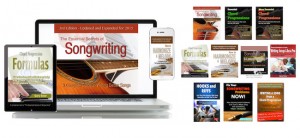One of the best ways to avoid writer’s block before it ever happens is to create a songwriting schedule. Scheduling your writing takes patience and discipline, but it keeps your mind feeling creative.
One of the reasons you probably hate scheduling is that it forces you to write even when you don’t feel like it. But that shouldn’t stop you. There are some days when you’ll want to simplify what it is you’re writing. Brainstorming song titles, for example, is a simple activity that keeps you thinking, but doesn’t require you to write full songs.
 Got songwriting problems, but don’t know where to begin diagnosing the issues? “Fix Your Songwriting Problems – NOW!” describes 7 of the most common songwriting problems, and offers solutions you can try right away. Get it separately, or as part of “The Essential Secrets of Songwriting 10-eBook Bundle”
Got songwriting problems, but don’t know where to begin diagnosing the issues? “Fix Your Songwriting Problems – NOW!” describes 7 of the most common songwriting problems, and offers solutions you can try right away. Get it separately, or as part of “The Essential Secrets of Songwriting 10-eBook Bundle”
That’s part of what sensible means in this context. It means knowing what to spend your time writing as much as when. What follows are a number of tips to consider when you’re trying to create a songwriting schedule.
Dealing With Scheduling
- Creating a daily schedule should be possible for most of us. You should consider 5 out of 7 days per week the norm to aim for. Yes, give yourself a couple of days off.
- Guilt plays no role in a sensible schedule. If you’ve got a day that keeps you working or attending school from morning to night, that’s a great opportunity for a day off from writing. Don’t force yourself to write on days where you are mentally exhausted.
- Get creative with when you write. You may be used to writing first thing in the morning, or last thing at night. But changing your schedule from day to day can work well, and allows you to fit writing in and around a complicated work or school schedule.
- Write down your schedule and stick to it. Think of it as you would a work schedule. If you’ve written down Tuesdays, 4:00 – 5:00 pm., for example, stick to it. If friends want to get together with you, keep your schedule. Fit in friends around it.
Dealing With Substance – What to Write During Your Sessions
- Try not to determine too much ahead of time the kind of things you’ll write during your songwriting sessions. There are some days when ideas will flow freely, and you can almost complete an entire song in an hour. On other days you may feel far less creative. That’s normal. So on those less-than-creative days, have a list of simple songwriting activities that will still allow you to feel creative. (Check the end of this article for ideas.)
- Try dedicating certain sessions to a particular songwriting element. For example, you might devote your Monday morning sessions to creating lyrics, Tuesdays for chord progressions, and so on. You’ll know right away if that’s a good way of working. You may discover, however, that mixing up duties in every session is a better fit for you.
- Avoid being overly judgemental of your songwriting sessions. You may have hoped to finish the song you started the other day, for instance, but can’t get there. That’s not often an indication that something’s gone wrong. It simply means that you need more time. That’s also normal – very normal.
To not have a songwriting schedule often means treating songwriting the same way you’d buy a chocolate bar: on the spur of the moment, as it occurs to you. But something as important as writing music deserves a much better and more dedicated approach.
The Simple Things
The most important aspect to remember is avoiding creating pressure for yourself. Don’t write if you feel frustrated or exhausted. On days when you feel that the creative juices aren’t flowing, simplify everything, and do some basic activities that are fun and easy.
Here’s a quick list of things that keep your brain feeling artistic and successful:
- Creating song titles. Titles often tend to be succinct and descriptive. For your songwriting sessions, don’t worry so much how you’d use the titles you create, just get something interesting written down. And let your mind wander: “Falling Down”; “Help Me Find the Way”; “Guide Line”; “Have No Fear”… that kind of thing.
- Creating chord progressions. Work quickly, and get 3- or 4-chord progressions written down. Throw in altered chords, non-diatonic chords (i.e., ones that don’t belong to the key you’re in), etc.
- Creating Lyrics. Create short lines, and don’t worry that you don’t know how they might figure into a song. “I’m walking out, not coming back…” “Hold on, keep it going, don’t forget to breathe…” Just the creation of lines like this can get your mind moving in a certain direction, and can be the germ that leads to a more complete lyric.
- Creating melodies. With your guitar or other chording instrument, strum a chord and sing a line of 4 or 5 notes moving up or down. repetition plays an important role in good melodic structure, so try repeating that line with a different chord underneath. It’s best to record your efforts in a digital recorder of some sort. You’ll find that a lot of what you write won’t be immediately useable, but everyone once in a while, a fragment will happen that has possibilities.
 Written by Gary Ewer. Follow Gary on Twitter
Written by Gary Ewer. Follow Gary on Twitter
 Thousands of songwriters are using “The Essential Secrets of Songwriting” eBook bundle to polish their songwriting technique. Every aspect of how to make a song better is covered. Stop wasting time — take your songwriting technique to a new level TODAY. Ten eBooks, plus a free one: $37 USD (Immediate download)
Thousands of songwriters are using “The Essential Secrets of Songwriting” eBook bundle to polish their songwriting technique. Every aspect of how to make a song better is covered. Stop wasting time — take your songwriting technique to a new level TODAY. Ten eBooks, plus a free one: $37 USD (Immediate download)










